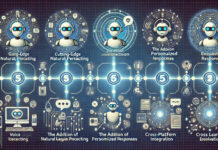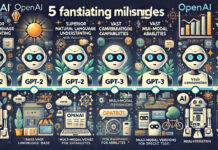Table of Contents
Artificial Intelligence (AI) is revolutionizing various sectors, and mental health is no exception. Integrating AI in mental health care provides innovative tools and solutions that enhance wellbeing, improve diagnosis, and offer personalized treatment. This article explores the transformative role of AI in mental health, examining the benefits, challenges, and future implications of these cutting-edge technologies.
The Role of AI in Mental Health
AI plays a crucial role in several key areas of mental health, including early diagnosis, personalized therapy, and continuous monitoring. These advancements make mental health care more accessible, efficient, and tailored to individual needs.
1. Early Diagnosis and Screening
AI-powered tools analyze data from various sources, such as social media, electronic health records, and self-reported symptoms, to identify early signs of mental health issues. Machine learning algorithms detect patterns and anomalies that might indicate conditions like depression, anxiety, or bipolar disorder. Early diagnosis allows for timely intervention, potentially preventing the escalation of mental health problems.
2. Personalized Therapy
AI also facilitates personalized therapy. It helps design customized treatment plans based on an individual’s unique needs and preferences. For example, AI-driven platforms can recommend specific therapeutic approaches, such as cognitive-behavioral therapy (CBT) or mindfulness practices, tailored to the user’s condition and progress.
3. Continuous Monitoring and Support
Continuous monitoring is essential for effective treatment and relapse prevention. AI-enabled apps and wearables track mood, sleep patterns, physical activity, and other indicators of mental health. These tools provide real-time feedback and support, helping users manage their mental wellbeing more effectively.
Innovative AI Tools for Mental Health
Several innovative AI tools support mental health care, ranging from chatbots and virtual therapists to advanced diagnostic systems.
1. Chatbots and Virtual Therapists
AI chatbots and virtual therapists offer accessible mental health support. These tools use natural language processing (NLP) to understand and respond to users’ concerns. They provide immediate assistance, emotional support, and guide users through therapeutic exercises. Notable examples include Woebot, Wysa, and Replika, which engage users in meaningful conversations and support their mental health journey.
2. AI-Powered Diagnostic Tools
AI-powered diagnostic tools enhance the accuracy and efficiency of mental health assessments. These tools analyze data from various sources, including clinical interviews, questionnaires, and biomarkers, to provide comprehensive diagnostic insights. For instance, AI algorithms can analyze speech patterns, facial expressions, and physiological data to identify symptoms of depression or anxiety.
3. Predictive Analytics
Predictive analytics tools leverage AI to forecast mental health trends and potential crises. By analyzing historical data and identifying risk factors, these tools predict the likelihood of mental health issues and recommend preventive measures. This proactive approach helps clinicians and patients manage mental health more effectively and avoid potential relapses.
Benefits of AI in Mental Health
The integration of AI in mental health care offers numerous benefits, including improved accessibility, personalized treatment, and enhanced monitoring.
1. Improved Accessibility
AI tools make mental health care more accessible to a broader population. Chatbots and virtual therapists provide support to individuals who may not have access to traditional therapy due to geographical, financial, or social barriers. These tools offer a convenient and cost-effective alternative to face-to-face therapy.
2. Personalized Treatment
AI enables personalized treatment plans tailored to individual needs. By analyzing data from various sources, AI recommends the most effective therapeutic approaches and monitors progress in real-time. This personalized approach enhances treatment outcomes and improves patient satisfaction.
3. Enhanced Monitoring and Support
Continuous monitoring and real-time feedback are crucial for effective mental health management. AI tools track various indicators of mental wellbeing and provide timely support to users. This continuous engagement helps individuals manage their mental health more proactively and reduces the risk of relapse.
Challenges and Ethical Considerations
While AI offers significant benefits for mental health care, it also presents challenges and ethical considerations that must be addressed.
1. Data Privacy and Security
Using AI in mental health involves collecting and analyzing sensitive personal data. Ensuring the privacy and security of this data is paramount. Organizations must implement robust data protection measures and comply with relevant regulations to safeguard users’ information.
2. Algorithmic Bias
AI algorithms can exhibit bias if trained on biased data. This can lead to unequal treatment and misdiagnosis for certain groups. Ensuring AI systems are trained on diverse and representative datasets is essential to minimize bias and improve fairness.
3. Dependence on Technology
While AI tools offer valuable support, there is a risk of over-reliance on technology for mental health care. It is important to strike a balance between AI-driven solutions and human intervention. AI should complement, not replace, traditional mental health care provided by trained professionals.
Conclusion
AI is transforming mental health care by providing innovative tools that enhance diagnosis, personalize treatment, and offer continuous support. These advancements make mental health care more accessible, efficient, and tailored to individual needs. However, addressing the challenges and ethical considerations associated with AI is crucial to ensure its responsible and effective use. As AI technology continues to evolve, its potential to improve mental health care and overall wellbeing is immense.
For further insights into AI and its applications, stay tuned to our series on AI News.



